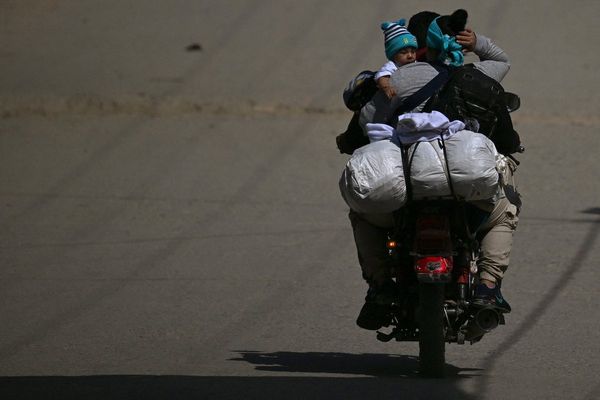
The ACT chief minister has fired an extraordinary broadside at Walter Sofronoff for breaching “good faith” obligations by leaking his own inquiry report and speaking to journalists throughout his own inquiry, raising the prospect of prosecution or a referral to the integrity commission.
At a press conference on Monday, an irate Andrew Barr accused Sofronoff of “a lapse of judgment”, suggesting he “is not the first person who has had their confidences breached by that media outlet” after the inquiry head handed his report to the Australian before giving it to the ACT government.
Despite publishing a detailed story on the findings on Wednesday night, the Australian has denied breaching an embargo and declared it will “not reveal” its sources.
In a statement on Monday the ACT government said that the early release of the report on the prosecution of Bruce Lehrmann had “interfered with the due process that should have been afforded to impacted parties” but it “maintains confidence” in the recommendations.
Barr told reporters in Canberra that Sofronoff had explained to him that he had provided a copy of the report to a newspaper columnist and a broadcast journalist.
“Each of them was given a copy upon express agreement by them that the copy was embargoed until the government had published it.”
The ACT’s Inquiries Act only allows boards of inquiry to submit their reports to the chief minister of the ACT, and includes punishments for any member of a board of inquiry who “produce to any person, or permit any person to have access to” documents provided for in the act.
Sofronoff explained to the chief minister that he believed it was “possible to identify journalists who are ethical” and that he judged neither of the pair would “take the serious step of betraying his trust by behaving unprofessionally”.
“The government has now sought advice on whether the premature release of the report constitutes a breach of the Inquiries Act and what further action is required,” Barr said. Asked if he would like to see Sofronoff charged, Barr said the government is considering its options.
Main points from the report
- The ACT government has agreed to eight of 10 recommendations and agreed in principle to two further matters.
- The report found it was appropriate to prosecute the matter, on the information available to ACT policing and the director of public prosecutions.
- However, the ACT DPP, Shane Drumgold, whose concerns in November 2022 sparked the inquiry, has stepped down from the role.
- The report included what the inquiry chair, Walter Sofronoff, described as “serious findings of misconduct” by Drumgold. But Sofronoff accepted it was not part of his remit to determine whether the DPP was a “fit and proper person” to remain a barrister or DPP.
- A government review of the 18 criminal cases Drumgold conducted, or in which he participated in, since his appointment as DPP in 2019 found “no more detailed examination is warranted”.
- ACT police officers “accomplished a thorough investigation ... (but) made some mistakes”. None of the mistakes affected the substance of the investigation and none of them prejudiced the case.
- The board of inquiry chair provided his report to media organisations, one of which received it before the ACT chief minister - a move the government considered interfered with due process. The government is seeking advice on whether the release breached the Inquiries Act.
- The government may change the Inquiries Act to strengthen non-disclosure provisions.
Recommendations to be acted on
- Training of police officers on the handling of counselling notes, the threshold to charge someone over sexual offences and the adjudication process.
- Law change to ban the disclosure of protected confidences at the investigation stage of the criminal process.
- Updating the ACT’s prosecutions policy to provide a process for recording retrial decisions.
- Set up a new complaints mechanism involving the DPP and ACT policing.
- Police are to inform a complainant once a decision to charge has been reached, unless it would prejudice an investigation or a matter more generally.
Barr said that a “reasonably straight reading” of the section on non-disclosure “would clearly indicate” an alleged breach but the government is considering whether there are any “mitigating circumstances” and is seeking legal advice.
Sofronoff also revealed that he “sometimes told journalists what appeared” to him “to be the issues that would arise on the following day’s hearings”, Barr said.
“That, I think, is also concerning. There are many possible pathways. It might be that a full referral to the integrity commission to examine the conduct of the inquiry may be a pathway.”
Barr said calling another inquiry into the leak “runs the risk of being quite ridiculous”.

Barr said the Sofronoff inquiry should have drawn a line under the prosecution of Lehrmann but “the leaking, the engagement with journalists on the way through” had left “significant questions”.
“And it is just so disappointing.
Asked about the suggestion the Australian may have had other sources, Barr quipped: “I am reminded of the film Muriel’s Wedding when Bill Heslop says ‘Deidre Chambers – what a coincidence.’ What a coincidence indeed.”
The Australian has denied breaching an embargo.
In a letter to Barr, obtained by News.com.au, Sofronoff said he provided it to the Australian and the ABC on the express agreement that the findings would not be published until after the government released the report.
“It served to ensure that when the government published the report that those two journalists would be in a position swiftly and promptly to write and broadcast stories that would have at their foundation a true appreciation of the result of the work of the commission,’’ Sofronoff said, according to News.com.au.
On Monday Barr was asked if Sofronoff may have provided the report to guard against a fear it “was going to be suppressed or redacted in some way”.
Barr replied: “No. Unequivocally, no.”
“I was very clear. He breached his good faith to me by releasing that report ahead of giving it to who he was meant to under the legislation.”
Sofronoff has been contacted for comment.







